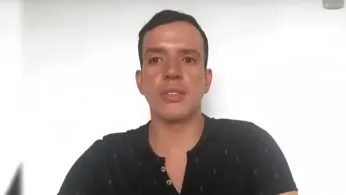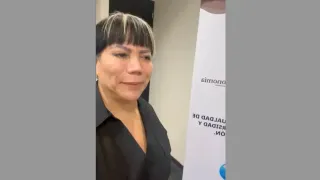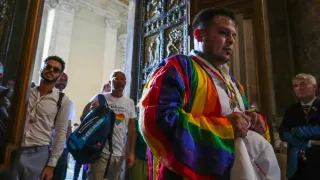
6 hours ago
Out Venezuelan Makeup Artist Andry Hernandez Romero Shares His Journey Through Incarceration and Survival
READ TIME: 3 MIN.
On a recent MSNBC segment, Andry Hernandez Romero, a Venezuelan migrant, makeup artist, and openly gay man, bravely narrated the ordeal he faced between 2024 and 2025 after seeking asylum in the United States. Hernandez Romero explained that, instead of refuge, he was detained and ultimately deported to El Salvador, where he was incarcerated for four months in the notorious CECOT prison—an institution widely reported as among the most dangerous in the world. His account, delivered with the aid of a translator, offered viewers a rare and deeply personal look at the intersection of migration, queer rights, and the failures of international detention systems .
CECOT, a maximum-security facility, has gained global attention for allegations of overcrowding, inhumane conditions, and abuse of inmates. Hernandez Romero, whose profession as a makeup artist marked him as visibly queer, described facing heightened risks and trauma due to his LGBTQ+ identity while incarcerated. He recounted physical and psychological abuse, including torture, isolation, and denial of basic rights, all of which compounded the already dire conditions for LGBTQ+ detainees in such environments .
Despite the unimaginable adversity, Hernandez Romero emphasized the role of faith, hope, and the power of community in surviving the ordeal. On MSNBC, he spoke of moments where solidarity among fellow detainees allowed him to endure both the violence and the isolation, and how his identity as a gay man became a source of both vulnerability and strength.
He credits his survival to acts of kindness from other prisoners, small gestures of humanity amidst brutality, and his unwavering belief in the possibility of justice. Hernandez Romero also highlighted the importance of maintaining his dignity—even in the face of systemic abuse—and how his work as a makeup artist symbolized self-expression and resilience for queer people in hostile environments .
Now free, Hernandez Romero has become a vocal advocate for LGBTQ+ migrants and detainees, using his platform to raise awareness about the dangers faced by queer asylum seekers in detention centers worldwide. His MSNBC interview has drawn attention to the urgent need for reform in how governments handle vulnerable populations, particularly LGBTQ+ individuals whose risk of abuse is exacerbated by their visibility and lack of legal protections.
Romero’s story has resonated across social media and advocacy organizations, with calls for accountability and policy changes to prevent future abuses. He continues to rebuild his life, finding solace in his craft and LGBTQ+ community networks, while working to ensure others do not endure similar suffering .
Hernandez Romero’s experience underscores the complex intersection of migration, sexuality, and human rights. LGBTQ+ asylum seekers are often doubly marginalized—fleeing persecution in their home countries, only to face new threats in detention systems that fail to recognize their unique vulnerabilities. The story has prompted renewed discussions among activists and policymakers regarding safer, more inclusive pathways for LGBTQ+ migrants, emphasizing the need for trauma-informed care, legal assistance, and access to supportive community organizations.
Major advocacy groups have cited Romero’s case as emblematic of structural failures in international detention and deportation processes. His interview on MSNBC has become a rallying point for efforts to better protect LGBTQ+ migrants, ensure accountability for abuses, and offer comprehensive support for survivors .
As Hernandez Romero continues to speak out, LGBTQ+ rights organizations and allies have amplified his call for justice. The demand for systemic change is clear: governments must uphold the dignity and safety of all migrants, with particular attention to those whose identities expose them to heightened risk.
Romero’s resilience, generosity, and commitment to advocacy offer a powerful example to the global LGBTQ+ community and beyond. His story, as shared on MSNBC, is not only a testimony of survival, but also a challenge to institutions to ensure that no one is forced to endure such suffering for simply seeking safety and authenticity .






